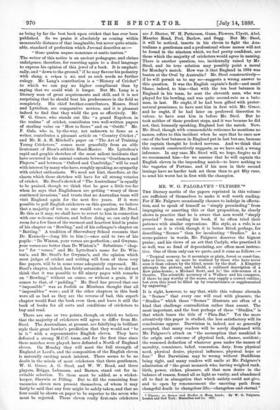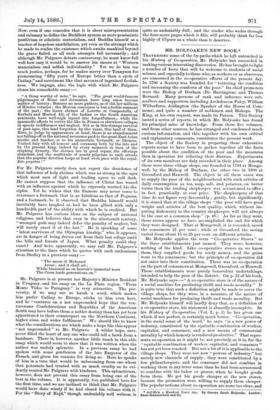MR. W. G. PALGRAVE'S "ULYSSES."* THE literary merits of the
papers reprinted in this volume are sufficient of themselves to make it well worth reading. For if Mr. Palgrave occasionally chooses to indulge in affecta- tion, and to speak of himself as "simply prescinding " from impugning or asserting this or that proposition, he clearly shows in practice that he is aware that men would "simply prescind " from reading his book, if he often tried their patience with similar expressions. His style, as a rule, is as correct as it is vivid, though it is better fitted, perhaps, for describing " Scenes " than for inculcating "Studies." Is a scene-painter in words, Mr. Palgrave deserves the highest praise; and his views of an art that Carlyle, who practised it so well, was so fond of depreciating, are often most instruc- tive. One of them only can we quote, and it runs as follows :—
"Tropical scenery, be it mountain or plain, forest or coast-line, lake or river, can no more be realised by those who have never seen it than colours by the blind, music by the deaf. A Kingsley attempts the picture, and behold, a confused description of a Kew palm-house; a Michael Scott, and lo ! the side-scenes of a theatre. The scientific accuracy of a Wallace and his compeers, if there be any worthy of the name, may supply a correct outline; but even this must be filled up by remembrance or supplemented by engraving."
It is right, however, to say that, while this volume abounds in " Scenes " that every one will read with pleasure, the " Studies " which those " Scenes " illustrate are often of a kind that challenge contradiction rather than assent. The
most important, and the best perhaps of these "Studies," is that which bears the title of " Phra-Bat." Yet the more attentively this paper is studied, the less satisfactory will its conclusions appear. Darwinism is, indeed, not so generally accepted, that many readers will be sorely displeased with Mr. Palgrave's attack on "the assumption that mankind is the origin and outcome of physical luck, chance, accident;
the reasoned deduction of whatever goes under the names of morality, conscience, belief, veneration, duty, from physical need, physical desire, physical influence, physical hope or fear." But Darwinism may be wrong without Buddhism
being right, and many readers will smile at Mr. Palgrave's admiration of "the great monarch who, having weighed rank, birth, power, riches, pleasure, all that men desire in the balance of reason, found all as light as vanity, and abandoned all to find in abnegation that which satiety could not give, and to open by renouncement the unerring path from changeful death to changeless life,—changeless and eternal."
• Ulysses; or, Scenes and Studies in Many Lands. By W. G. Palgrave. London and New York : Macmillan and Co. 1887.
Now, even if one concedes that it is sheer misrepresentation and calumny to define the Buddhist system as mere pessimistic positivism or atheistic materialism, and Buddha himself as a teacher of hopeless annihilation, yet even so the attempt which he made to realise the existence which awaits nna.nicind beyond the grave failed, as all such attempts fail necessarily ; and
although Mr. Palgrave detests controversy, he must know full well how easy it would be to answer his sneers at "Western materialism and selfish individuality." Yet we do him too
much justice, perhaps, for he makes merry over Tennyson for pronouncing "fifty years of Europe better than a cycle of Cathay," and merriment like that savours of ingrained foolish- ness. We impugn, also, the logic with which Mr. Palgrave closes his remarkable essay :—
"A thing worthy of note," he says. "The great world-famous pilgrimages of Rome and Jerusalem have long since become matter of history ; Benares no more gathers, as of old, her millions of Hindoo votaries ; the Meccan concourse is but a feeble remnant of the past ; the lesser shrines of Loretto or Compostella, of Kerbela and Meshed Ali, of the Indian or the South American peninsula, have well-nigh lapsed into forgetfulness ; while the spasmodic efforts to revive the like in France or elsewhere collapse in speedy indifference and neglect. Not so in this strange survival of past ages, this land forgotten by the years, this land of Siam. Here, to judge by appearances at least, there is no abandonment nor falling-off in the national reverence paid to the great East Asian ascetic and teacher, or to his memorials, footmark, or likeness. Visited duly with all honour and ceremony both by the late and by the present king, indeed by every monarch in turn of the reigning dynasty, the shrines are in good repair, the offerings abundant, and the multitude of yearly pilgrims to each attests that the popular devotion keeps at least even pace with the royal. Esto porpetua !"
For Mr. Palgrave surely does not regret the decadence of that influence of holy shrines which was so strong in the ages
which most men of light and leading agree to call dark. He cannot suppose that the influence of Christ has waned with an influence against which he expressly warned his dis- ciples. Yet he wishes that the Siamese may never cease to reverence a footraaxk that is as fabulous as that of Pegasus, and a footmark, be it observed, that Buddha himself would inevitably have laughed at, had he been gifted with only a hundredth part of the ability with which he is credited. But Mr. Palgrave has curious ideas on the subject of national religions, and believes that even in the nineteenth century, "wronged gods may indeed defer the penalty of neglect, but will surely exact it at the last." He is speaking of some "latest survivors of the Olympian kinship," who, it appears, are in danger of being driven out from their last refuge amid the hills and forests of Japan. What penalty could they exact P And here, apparently, we may call Mr. Palgrave's attention to the lines which he quotes with such enthusiasm from Shelley in a previous essay :—
"The moon of Mahomet Arose ; and it shall set;
While blazoned as on heaven's immortal noon The Cross leads generations on."
Mr. Palgrave is at present her Majesty's Minister Resident in Uruguay, and his essay on the La Plata region, "From Monte Video to Paraguay," is very attractive. The per-
versity, if we may use so harsh a word, which makes him prefer Cathay to Europe, sticks to him even here, and he "ventures on a not ungrounded hope that the ven- turesome Confederations and Republics of the American South may have before them a nobler destiny than has yet been apportioned to their counterpart on the Northern Continent, higher aims, and wider fulfilment." We should like to know what the considerations are which make a hope like this appear "not ungrounded" to Mr. Palgrave. A wilder hope, sure, never filled the heart of any one who could tell a hawk from a handsaw, There is, however, another little touch in this able essay which would seem to show that it was written when the author was unduly splenetic. In a previous essay he had spoken with some gentleness of the late Emperor of the French, and given his reasons for doing so. Here he speaks of him in a tone that would be unbecoming from one whom that potentate had treated with as much cruelty as he evi- dently treated Mr. Palgrave with kindness. This spleneticism, however, does not prevent this essay from being one of the best in the volume. It is apparently, too, published here for the first time, and we are inclined to think that Mr. Palgrave would have done wisely if he had closed his volume with it. For the "Story of Nejd," though undeniably well written, is
quite as undeniably dull ; and the reader who wades through the four-score pages which it fills, will probably think far-less. highly of Ulysses as a whole than it deserves.



































 Previous page
Previous page